Why can't they just leave these poor lottery winners in peace?
This is from the Huffington Post.
Thanks,
Preston
____________________________
LAKELAND, Fla. — In 2006, Abraham Shakespeare – a truck driver's assistant who lived with his mother – won $30 million in the Florida lottery. His good fortune may have cost him his life.
Shakespeare vanished months ago. His mother hopes he is somewhere in the Caribbean, lying on a beach and enjoying the good life away from all the hangers-on who were constantly hitting him up for money.
The sheriff has a more ominous theory: Shakespeare was killed.
"There are a lot of odd and bizarre circumstances in this case," Sheriff Grady Judd said. "We fear and are preparing for the worst. We're working this case as if it were a homicide."
On Wednesday, Judd said investigators have a "person of interest" in the disappearance: a 37-year-old woman who befriended Shakespeare after he won the lottery.
Judd said Dorice Donegan "DeeDee" Moore has information about Shakespeare.
Shakespeare, 43, won the big jackpot after buying a lottery ticket at a convenience store in a town called Frostproof, claiming later that he gave the last $3 in his pocket to a homeless man just before the winning numbers were announced.
Shakespeare – who had a criminal record that included arrests and prison time for burglary, battery and not paying child support – took a lump-sum payment of $16.9 million instead of annual installments.
He bought a Nissan Altima, a Rolex from a pawn shop, a $1 million home in a gated community. He talked about starting a foundation for the poor and insisted the money wouldn't change him.
"I'm not a material person," he said in 2007. "I don't let material things run me. I'm on a tight budget."
The money quickly caused him problems.
A former co-worker sued him in 2007, accusing Shakespeare of stealing the winning ticket from him. Six months later, a jury ruled the ticket was Shakespeare's.
Then there were the people constantly asking him for a piece of his fortune.
"They didn't wait. They just came right after they found out he won this money," his mother, Elizabeth Walker, said recently.
She said her son was generous, paying for funerals, lending money to friends starting businesses and even giving a million dollars to a guy known only as "Big Man."
Not long after he bought the million-dollar home in early 2007, he was approached by Moore, said family and officials.
Moore – who could not be reached by The Associated Press – said she was interested in writing a book about Shakespeare's life. She became something of a financial adviser to Shakespeare, who never graduated high school.
Property records show that Moore's company, American Medical Professionals, bought Shakespeare's home for $655,000 last January. His mother said the last time she saw him was shortly afterward, around her birthday in February.
Detectives said Wednesday in a news release that Moore began using Shakespeare's cell phone in April 2009 to text the man's relatives and friends to have them believe it was Shakespeare attempting to contact them.
Officials also said Moore is believed to have offered to give away a home worth approximately $200,000 in exchange for making a false report to law enforcement regarding an alleged recent sighting of Shakespeare.
Detectives say Moore also paid one of Shakespeare's relatives $5,000 to hand deliver a birthday card containing cash to Shakespeare's mother suggesting that the card was from her son.
A telephone number connected to Moore was disconnected Wednesday.
The sheriff said the last time anyone saw Shakespeare was in April – but it wasn't until Nov. 9 that he was reported missing, by a police informant.
And the story gets more bizarre.
According to The Ledger of Lakeland, the 37-year-old Moore contacted reporters at the newspaper in April, saying Shakespeare was "laying low" because people tried to suck money out of him.
That made sense to Shakespeare's mother – sort of. "I remember once, talking with me over the phone, he said he might go to Jamaica," she said.
On Dec. 5, a sobbing Moore told The Ledger that she helped Shakespeare disappear, but now wants him to return because detectives were searching her home and car and looking for blood on her belongings. She said she was also upset that detectives went through her belongings and car while looking for clues in Shakespeare's disappearance.
One reason he wanted to leave, she said, was a child support case for a child he allegedly fathered after winning the lottery. "Abraham sold me his mess to get a better life," she told the paper.
She even gave the paper a video that she said she took of Abraham. In the video, he says he is tired of people asking him for money. "They don't take no for an answer," he says.
"So where you wanna go to?" Moore asks in the video.
"It don't matter to me. I'm not a picky person," Shakespeare replies.
Moore told the paper that she took the video to "protect herself."
Moore said she filed paperwork to take over five mortgages totaling about $370,000 that had been owed to Shakespeare. She said she sold the loans at a loss to another person. She added that many of the people who borrowed from Shakespeare have refused to pay, and she feels threatened by some of them.
Moore's past includes a year of probation after she was charged with falsely reporting that she was carjacked and raped in 2001. Officials said she concocted the scheme so her insurance company would reimburse her for the SUV, which she claimed had been stolen.
The woman did not answer several calls placed to a number listed for her in public records. During a recent visit to the home she bought from Shakespeare, a security box rang to a phone number that had been disconnected.
Sheriff's officials won't comment on Moore's involvement in Shakespeare's life.
The sheriff said that Shakespeare spent the bulk of his lottery winnings. The fact that he didn't call his mother on Christmas reinforces the theory that Shakespeare is not just hiding, Judd said.
"I hope so much that he is alive somewhere," said his mother. "And I want people to know, if they ever win the lottery, I hope they know how to handle the people that come after them. They can be dangerous."
A blog for lovers of the printed word (novels, short stories, poems--the Ing so to speak), popular film, politics, and casinos (the Bling).
Thursday, January 7, 2010
Subscribe to:
Posts (Atom)
Lipshitz 6

Reading T Cooper for Christmas
Click Here to Purchase Lipshitz 6
Punk Blood

Jay Marvin
Click Here to Purchase Punk Blood
Breath, Eyes, Memory

Anonymous Rex
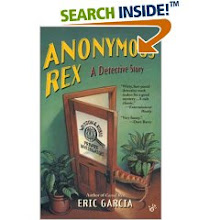
Reading Eric Garcia for Christmas
Click Here to Purchase Anonymous Rex
Vinegar Hill

Reading A. Manette Ansay for Christmas
Click Here to Purchase Vinegar Hill
Nicotine Dreams

Reading Katie Cunningham for Christmas
Click Here to Purchase Nicotine Dreams
Junot Diaz
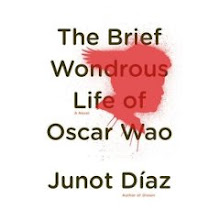
Pulitzer Prize Winner!!!
Click Here to Purchase The Brief Wondrous Life of Oscar Wao
Edwige Danticat

New Year's Reading
Click Here to Purchase Brother I"m Dying
Greed
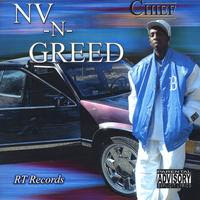
This Brother Is Scary Good
Sweet Music
One More Chance
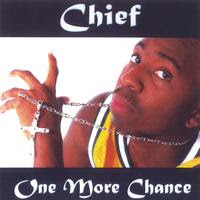
The genius Is At It Again/The Rapper CHIEF aka Sherwin Allen
Sandrine's Letter
Check out Sandrine's Letter To Tomorrow. You will like it, I insist.
Sandrine's Link
Cool Sites
- Akashic Books
- All or Nothing (My Other Blog)
- Asili The Journal
- Best Gamblling News Site
- Black Star Review
- Book Remarks
- Booktour.com
- Carolina Wren Press
- Click Here for Some Pretty Good Writing Contests
- Dedra Johnson
- Enrico Theoc
- Felicia Luna Lemus
- Florida Book Review
- Foreword Magazine
- Gambling Is Linked to Suicide
- Gambling Is Not Linked to Suicide
- Gaming Law Review
- Gene Durnell's The Thinking Journalist
- Gene Durnell's The Thinking Journalist
- Geoffrey Philp's Blog
- Get Chief's CDs on CD Baby
- Getting Past Gambling
- Gonzalo Barr's Blog
- Good Reads
- Hallema's Homepage
- Help With Gambling Addiction
- Jeremy Shipp's Website
- John Dufresne's Blog
- Leonard Nash Homepage
- Links to Seminole Casinos in Florida
- Martha Frankel's Homepage
- Michael A. Gonzales
- Miss Snark/ An Agent Gives Great Publishing Advice
- More Addiction Help
- No Gambling.com
- Pat MacEnulty
- ScrewIowa.com
- St. Louis Rams, The Greatest Show on Turf
- Suicide reference library
- T Cooper
- University of Florida
- Vicki Hendricks
- Walter Jacobs's Blog
- Writers Who Read
- Writing with Celia

All or Nothing

Editorial Reviews of All or Nothing
New York Times--". . . a cartographer of autodegradation . . . Like Dostoyevsky, Allen colorfully evokes the gambling milieu — the chained (mis)fortunes of the players, their vanities and grotesqueries, their quasi-philosophical ruminations on chance. Like Burroughs, he is a dispassionate chronicler of the addict’s daily ritual, neither glorifying nor vilifying the matter at hand."
Florida Book Review--". . . Allen examines the flaming abyss compulsive gambling burns in its victims’ guts, self-esteem and bank accounts, the desperate, myopic immediacy it incites, the self-destructive need it feeds on, the families and relationships it destroys. For with gamblers, it really is all or nothing. Usually nothing. Take it from a reviewer who’s been there. Allen is right on the money here."
Foreword Magazine--"Not shame, not assault, not even murder is enough reason to stop. Allen’s second novel, All or Nothing, is funny, relentless, haunting, and highly readable. P’s inner dialogues illuminate the grubby tragedy of addiction, and his actions speak for the train wreck that is gambling."
Library Journal--"Told without preaching or moralizing, the facts of P's life express volumes on the destructive power of gambling. This is strongly recommended and deserves a wide audience; an excellent choice for book discussion groups."—Lisa Rohrbaugh, East Palestine Memorial P.L., OH
LEXIS-NEXIS--"By day, P drives a school bus in Miami. But his vocation? He's a gambler who craves every opportunity to steal a few hours to play the numbers, the lottery, at the Indian casinos. Allen has a narrative voice as compelling as feeding the slots is to P." Betsy Willeford is a Miami-based freelance book reviewer. November 4, 2007
Publisher’s Weekly--"Allen’s dark and insightful novel depicts narrator P’s sobering descent into his gambling addiction . . . The well-written novel takes the reader on a chaotic ride as P chases, finds and loses fast, easy money. Allen (Churchboys and Other Sinners) reveals how addiction annihilates its victims and shows that winning isn’t always so different from losing."
Kirkus Review--"We gamble to gamble. We play to play. We don't play to win." Right there, P, desperado narrator of this crash-'n'-burn novella, sums up the madness. A black man in Miami, P has graduated from youthful nonchalance (a '79 Buick Electra 225) to married-with-a-kid pseudo-stability, driving a school bus in the shadow of the Biltmore. He lives large enough to afford two wide-screen TVs, but the wife wants more. Or so he rationalizes, as he hits the open-all-night Indian casinos, "controlling" his jones with a daily ATM maximum of $1,000. Low enough to rob the family piggy bank for slot-machine fodder, he sinks yet further, praying that his allergic 11-year-old eat forbidden strawberries—which will send him into a coma, from which he'll emerge with the winning formula for Cash 3 (the kid's supposedly psychic when he's sick). All street smarts and inside skinny, the book gives readers a contact high that zooms to full rush when P scores $160,000 on one lucky machine ("God is the God of Ping-ping," he exults, as the coins flood out). The loot's enough to make the small-timer turn pro, as he heads, flush, to Vegas to cash in. But in Sin City, karmic payback awaits. Swanky hookers, underworld "professors" deeply schooled in sure-fire systems to beat the house, manic trips to the CashMyCheck store for funds to fuel the ferocious need—Allen's brilliant at conveying the hothouse atmosphere of hell-bent gaming. Fun time in the Inferno.
Florida Book Review--". . . Allen examines the flaming abyss compulsive gambling burns in its victims’ guts, self-esteem and bank accounts, the desperate, myopic immediacy it incites, the self-destructive need it feeds on, the families and relationships it destroys. For with gamblers, it really is all or nothing. Usually nothing. Take it from a reviewer who’s been there. Allen is right on the money here."
Foreword Magazine--"Not shame, not assault, not even murder is enough reason to stop. Allen’s second novel, All or Nothing, is funny, relentless, haunting, and highly readable. P’s inner dialogues illuminate the grubby tragedy of addiction, and his actions speak for the train wreck that is gambling."
Library Journal--"Told without preaching or moralizing, the facts of P's life express volumes on the destructive power of gambling. This is strongly recommended and deserves a wide audience; an excellent choice for book discussion groups."—Lisa Rohrbaugh, East Palestine Memorial P.L., OH
LEXIS-NEXIS--"By day, P drives a school bus in Miami. But his vocation? He's a gambler who craves every opportunity to steal a few hours to play the numbers, the lottery, at the Indian casinos. Allen has a narrative voice as compelling as feeding the slots is to P." Betsy Willeford is a Miami-based freelance book reviewer. November 4, 2007
Publisher’s Weekly--"Allen’s dark and insightful novel depicts narrator P’s sobering descent into his gambling addiction . . . The well-written novel takes the reader on a chaotic ride as P chases, finds and loses fast, easy money. Allen (Churchboys and Other Sinners) reveals how addiction annihilates its victims and shows that winning isn’t always so different from losing."
Kirkus Review--"We gamble to gamble. We play to play. We don't play to win." Right there, P, desperado narrator of this crash-'n'-burn novella, sums up the madness. A black man in Miami, P has graduated from youthful nonchalance (a '79 Buick Electra 225) to married-with-a-kid pseudo-stability, driving a school bus in the shadow of the Biltmore. He lives large enough to afford two wide-screen TVs, but the wife wants more. Or so he rationalizes, as he hits the open-all-night Indian casinos, "controlling" his jones with a daily ATM maximum of $1,000. Low enough to rob the family piggy bank for slot-machine fodder, he sinks yet further, praying that his allergic 11-year-old eat forbidden strawberries—which will send him into a coma, from which he'll emerge with the winning formula for Cash 3 (the kid's supposedly psychic when he's sick). All street smarts and inside skinny, the book gives readers a contact high that zooms to full rush when P scores $160,000 on one lucky machine ("God is the God of Ping-ping," he exults, as the coins flood out). The loot's enough to make the small-timer turn pro, as he heads, flush, to Vegas to cash in. But in Sin City, karmic payback awaits. Swanky hookers, underworld "professors" deeply schooled in sure-fire systems to beat the house, manic trips to the CashMyCheck store for funds to fuel the ferocious need—Allen's brilliant at conveying the hothouse atmosphere of hell-bent gaming. Fun time in the Inferno.
At Books and Books
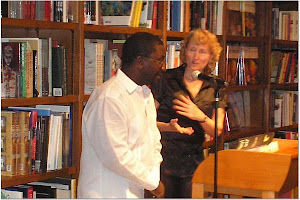
Me And Vicki at Our Reading
Bio
Preston L. Allen is the recipient of a State of Florida Individual Artist Fellowship in Literature and the Sonja H. Stone Prize in Fiction for his short story collection Churchboys and Other Sinners (Carolina Wren Press 2003). His works have appeared in numerous publications including The Seattle Review, The Crab Orchard Review, Asili, Drum Voices, and Gulfstream Magazine; and he has been anthologized in Here We Are: An Anthology of South Florida Writers, Brown Sugar: A Collection of Erotic Black Fiction, Miami Noir, and the forthcoming Las Vegas Noir. His fourth novel, All Or Nothing, chronicles the life of a small-time gambler who finally hits it big. Preston Allen teaches English and Creative Writing in Miami, Florida.